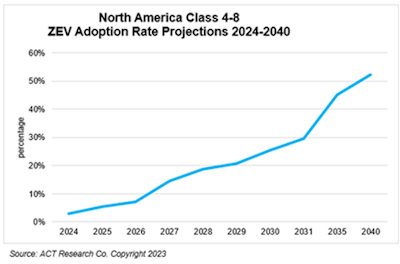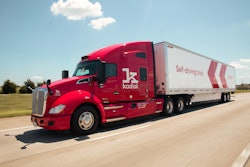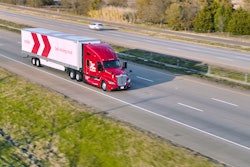Trucking news and briefs for Thursday, Sept. 14, 2023:
Teamsters release autonomous truck policy framework
The International Brotherhood of Teamsters this week released a guiding document for federal policymakers to address issues with autonomous vehicles AVs intended to prioritize workers and safety.
The framework, Autonomous Vehicle Federal Policy Principles, outlines key principles for Congress and federal regulators to follow for federal AV policy that the Teamsters said protects workers and enforces safety standards, including policy framework relating to:
- Regulating the vehicle: The federal government has authority over vehicle manufacturing and performance standards and must apply these authorities to self-driving cars and trucks
- Regulating the operator: Federal Motor Carrier Safety Administration regulates the driver of commercial vehicles, and the circumstances and safety conditions in which they operate
- Regulating operations: The DOT and FMCSA possess numerous regulatory authorities related to the safe operations of vehicles and the ability of carriers to receive authority to begin and continue operations
- Interaction with other laws: Congress must consider issues that may arise from the relationship between existing law and the efforts to legislate and regulate AVs
- Workforce impacts: Congress cannot entertain any legislative package dealing with self-driving cars and trucks that does not directly and forcefully address issues related to the workforce, and any changing operational or economic conditions that occur as the result of AV commercialization
"Hundreds of thousands of Teamsters turn a key for a living, so we are fiercely committed to working with Congress and federal regulators to get AV policy right," said Teamsters General President Sean M. O'Brien. "Strong federal AV policies must prioritize both workers and safety. Any legislation that puts workers and the general public at risk will be met with aggressive opposition by the Teamsters and our allies."
[Related: California Senate moves to ban driverless trucks]
Research estimates half of commercial vehicles will be zero-emissions by 2040
ACT Research said in a new report released Tuesday that half of commercial vehicles will be “zero-emissions” vehicles by 2040.
"We forecast a relatively low adoption rate from 2024 through 2026, reflecting the fact that BEV sales of commercial vehicles are still in their early years," said Ann Rundle, vice president of electrification and autonomy at ACT Research. "This begins to change in 2027, in part due to the cost increases for diesels because of the increased stringency of U.S. EPA's 2027 low-NOx regulations. In addition, by 2027, eight states will have joined California in adopting Advanced Clean Trucks, resulting in moderate growth in adoption rates."
 ACT Research estimates a slow adoption rate of "zero-emission" trucks until 2027, then a steady increase through 2040.
ACT Research estimates a slow adoption rate of "zero-emission" trucks until 2027, then a steady increase through 2040.
Analysts in the report, "Charging Forward," said that regulations will drive ZEV adoption in the North American commercial sector. By 2030, ACT sees 25% adoption rates as nine states that signed an MOU to adopt the California Air Resources Board's Advanced Clean Trucks regulations will have enacted those rules. It is also assumed, ACT said, that improved battery technology will negate battery replacement costs and that charging infrastructure utilization will significantly increase.
"By 2040, we are forecasting that adoption of ZEVs will account for just slightly above 50%," Rundle added. "Essentially half of all commercial vehicles will be zero emissions, primarily battery-electric vehicles."
"Charging Forward" is a multiclient decarbonization analysis of the North American battery and fuel cell electric vehicle market. ACT calls it an economic-driven, bottoms-up analysis done in collaboration with leaders in battery and fuel cell technology for Classes 4-8 vehicles.
ACT said it has developed and aggregated information across North America on propulsion systems technology development, both battery and fuel cell electric powertrains; government regulations and subsidies; electric and hydrogen supply and infrastructure; and crafted a total cost of ownership model with three scenarios.
[Related: Charging forward with electric truck charging stations]
FMCSA awards $80M in grants for truck safety, parking
The Federal Motor Carrier Safety Administration announced Wednesday more than $80 million in grant awards enabled by the 2021 infrastructure legislation to help reduce the frequency and severity of commercial motor vehicle crashes and support truck drivers by expanding access to truck parking; investing in technology; and improving safety in work zones, rural areas and high crash corridors.
The High Priority grants include a 65% increase in funding for truck parking projects over last year and enhance efforts to support truck drivers and improve safety such as:
- Expand access to truck parking by helping truck drivers locate available rest area truck parking spaces in real time via dynamic message signs along highways in Kentucky, Delaware and Indiana
- Research to support automated, location-based driver alerts via ELDs that inform drivers of upcoming work zones – improving safety for both the drivers and the workers
- Enhancement of electronic screening technologies to detect vehicle violations (such as automated license plate readers, USDOT number readers, tire monitoring system, and hazardous materials placard readers)
- Outreach and education to combat human trafficking, an effort in which truck drivers can play a key role given their time and attention on the road
FMCSA said the new grants for projects listed above build on previous Biden Administration investment in in building new truck parking spaces across the country, including:
- Caldwell County, Texas: $22.9 million RAISE grant to design and construct a truck parking plaza that improves safety and convenience for truck drivers. Plaza will include short- and long-term spaces with lighting, fencing, restroom and shower facilities, with 24-hour monitored security.
- Caldwell Parish, Louisiana: $10.5 million RAISE grant to buy land and build a truck parking facility near the port and a highway for 50 commercial trucks, 100 cars, and EV charging stations that are designed to provide auxiliary power units to power a truck cab’s heating and cooling, without having to run the engine while also recharging trucks. There will also be a system to find parking spaces in real-time.
- On I-4 Between Tampa and Orlando: $15 million INFRA grant for a new truck parking facility with approximately 120 spaces, electric charging stations, and pedestrian infrastructure to access nearby commercial amenities.
- Near Memphis, Tennessee: $22 million INFRA grant adds 125 truck parking spaces at a spot along I-40—a critical freight corridor. Project will also upgrade adjacent bridge structures.
“President Biden’s historic investment through the Bipartisan Infrastructure Law helps improve commercial motor vehicle safety on our roadways both at the national and local levels,” said FMCSA Administrator Robin Hutcheson. “Our grantees will dedicate these investments to innovative technology, research, and other projects that will positively impact CMV safety and move us towards the National Roadway Safety Strategy’s goal of zero deaths on our nation’s roadways.”











